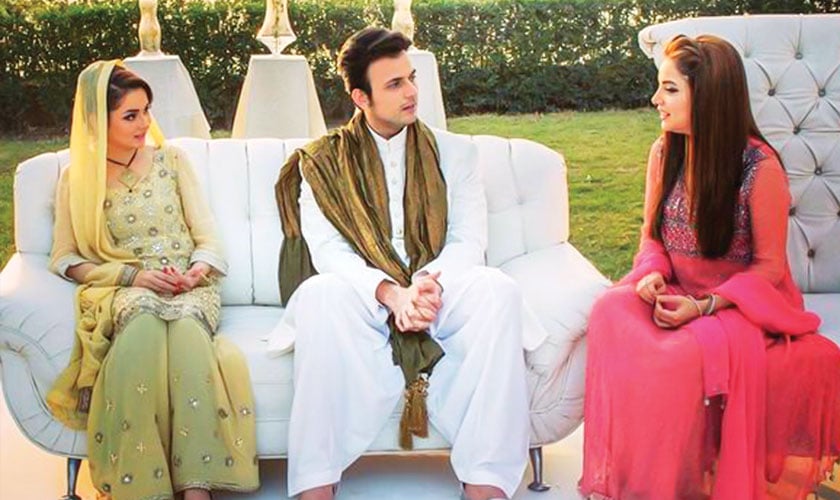One of the best things that Janaan did was introduce us to a crop of new and talented young faces, such as Bilal Ashraf, Hania Amir, Ali Rehman Khan and Usman Mukhtar.
InstepInterVIEW
The director turned actor is all set to shoot his first ever feature film, Parchi.
One of the best things that Janaan did was introduce us to a crop of new and talented young faces, such as Bilal Ashraf, Hania Amir, Ali Rehman Khan and Usman Mukhtar. Mukhtar may not have gotten the same amount of attention as the rest of the names on this list, owing to the fact that he played a small role in the film, but he definitely left people wanting more. Mukhtar plays Hania Amir’s quiet and reserved fiancé and while he had limited dialogues, it was evident that the man has screen presence and knows how to act.
While many people might recognize Mukhtar as an actor first, since he has already bagged his second cinematic outing which is Hareem Farooq’s upcoming film, Parchi, Mukhtar originally started out his journey as a film director and has worked on various cinematic projects in the past.

Behind the scenes: Usman Mukhtar with his co-stars Hania Amir and Armeena Rana Khan on the sets of Janaan.
However, for Parchi, Mukhtar will be delving into both roles simultaneously; he is playing a pivotal character in the film and is also the designated cinematographer. “A cinematographer’s job is very demanding and it gets worse when you’re acting in the same film that you’re shooting,” shared Mukhar when Instep got in touch with the actor-director over the phone. “It was very hectic and frustrating at times, juggling between the two roles.”
But how exactly did Mukhtar manage to shoot a film and act in it at the same time? “The pre-production phase was very intense, in which I mapped every scene with lots of details. On the day of the shoot, if I had to be in the frame, I would first set up the lights, set up the frame and the assistant DP had to simply press record while I would act.”
What further added to the challenge was the fact that this was Mukhtar’s first ever venture as a cinematographer. “I’ve always been a director. There were instances where I wouldn’t have the budget to hire a cinematographer; then I would do the camera work myself. To be honest, I wasn’t sure that I could do this but Imran (Kazmi, producer of Janaan and Parchi) had a lot of faith in me,” he shared.
If Mukhtar were to choose between acting and directing, Mukhtar effortlessly chooses direction. “I enjoy being able to create stories. Films are a strong medium. A director’s job is very fulfilling as he has to hold the finger of the film and walk it from start to finish. I really look up to the works of directors like Wes Anderson, Martin Scorsese, Anurag Kashyap and Shoaib Mansoor.”
It makes sense to get Mukhtar’s opinion on the role of film directors in Pakistan today, considering that our latest films have mostly been disappointing and the industry is wondering where everyone’s going wrong. “We don’t really have film directors in our country. We have directors who make TVCs but even if you look at our ads, you’ll see that they are mostly just beauty shots, there’s barely ever a narrative. Those shots don’t even have anything to do with the product. So these directors are turning into filmmakers and that’s where your problem is,” replied Mukhtar very confidently. “It’s more of a business at this point, as opposed to being an art form. But hopefully it will filter out as time goes by.”
One wonders whether Mukhtar was one of the lucky ones who managed to go to a film school to officially learn how to make films. “Unfortunately I wasn’t able to go to a film school and that happens when parents aren’t supportive of the idea that their son wants to be a filmmaker. That’s why I did journalism instead. I taught myself by reading up a lot and through practical work, like actually work on sets to learn the root of the craft. I even did a month long workshop back in 2009.”
But does it make a difference, whether one gets to go to a film school or not? After all, legendary directors such as Quentin Tarantino, James Cameron and Christopher Nolan never went to film school. “There are media schools and then there are film schools. Media studies are more concerned with theory while film schools are more concerned with practical work. But I think that schools are very restricting. They tell you to stay within the box and follow all the rules. True knowledge comes from doing things on your own. I remember how I used to do my own lights back when I started off. Such experiences really add to your knowledge and make you better at your work.”
Mukhtar has only just begun his journey and one cannot comment on the effectiveness of his professional style until his first feature film as a cinematographer releases, but we are curious to see what vision he has for himself. “Five years from now, I want to be known for producing good, quality work. I don’t want to be known for my looks, or for how much money I make. I want to be known as a filmmaker.